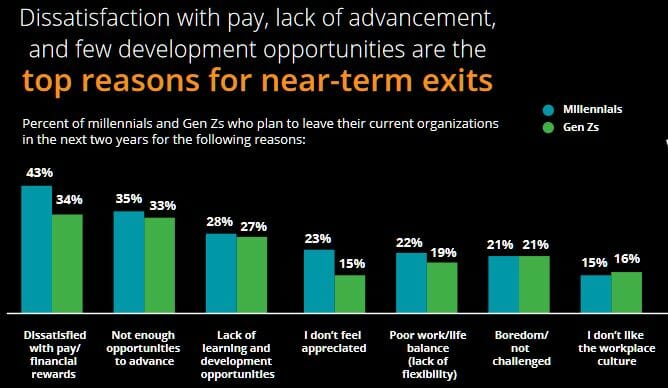Can traditional managers learn new ways to lead?
Us humans are typically heavily committed to our habits – even our bad habits. When presented with undeniable information about our lousy impact on others, we have the choice to embrace different behaviors or to ignore the reality in front of us and stay the course – even if it doesn’t serve us or others well.
Too often, we ignore the new information and keep doing what we’ve always done.
Too often, we show up in disrespectful ways while attempting to inspire results. We blame others for their misses, rather than coaching them. We demonstrate indifference rather than empathy – because demonstrating authentic care is seen as a weakness. We stay in “command and control” mode, telling others what to do rather than listening and enabling creative ways to solve problems at work.
Even when our leadership behaviors don’t make things better, when they don’t improve results or relationships, we stay the course.
We likely “lead how we lead” because of these three influences:
- Powerful role models – Our past bosses (and likely our current bosses) used old school management styles. We watched and we learned from those role models. We model what we’ve seen.
- Powerful reinforcement – We live in an organizational system that rewards results over all other things. We’re not measured, monitored, or rewarded for creating more positive relationships with team members. We’re not held accountable for treating others respectfully (in every interaction) or for retaining talented players in our company. Results are the only important thing.
- Powerful resignation – We don’t know any other way to manage results. We’re resigned to “doing what we’ve always done,” despite the failures we experience daily to inspire both respect AND results from our workforce, which includes younger generations of workers (millennials and Gen Zs) with different work preferences and styles.
So how can a champion of employee engagement – be it a senior leader, a small HR department, anyone – inspire managers to serve ALL of their team members effectively (not just a few)?
The following two approaches can vastly improve respect and results in your companies.
Show them the data
First, provide the manager with undeniable data about the manager’s primary customer: their team members.
Educate them about the different generational preferences of millennials and Gen Zs. Deloitte’s latest millennial survey demonstrates that neither generation is being treated well in workplaces today.
For example, both generations are pessimistic about the economy; only 26% believe the economic situation in their countries will improve in the coming year. In addition, only 22% of respondents expect improvement in the social and political climate in their countries.
That pessimism translates into workplaces, as well. 49% of millennials and 28% of Gen Zs would, if they had a choice, quit their current jobs in the next two years. The top reasons why they’d leave:
- Dissatisfaction with pay
- Too few opportunities to advance
- Lack of learning and development opportunities
- Don’t feel appreciated.
Every one of these pain points can be addressed by a leader or manager who wants to boost respect and results from all team members.
Second, provide the leader or manager with undeniable data about his or her impact on their team members.
Many of my clients use tools which assess leadership impact and provide unique insights into a manager’s personal leadership strategies and the impact of those strategies on team members’ behavior and performance. These tools can help managers truly understand the impact they’re having and change their behavior to increase beneficial – or constructive – impact in the days ahead.
Most of my clients also provide every formal leader with an annual values survey, which gathers feedback from team members on the degree to which their direct boss models the organization’s desired valued behaviors in daily interactions. This tool helps managers understand how well they model desired behaviors – and can inspire better alignment to the organization’s values and behaviors.
Teach them to adapt
As noted above, we humans are well-trained. Despite undeniable data, we can hang on to old ways even when we know those ways don’t lead to better outcomes and better relationships.
Translating information into changed behavior is hard work. Most managers will need training: How to coach effectively, how to problem-solve rather than tell others what to do, etc. And training alone won’t ensure alignment to more effective leadership behaviors. That takes reinforcement including demonstration of the new behaviors by their leaders, ongoing coaching to build confidence and skills in the new approaches, etc.
The more adaptable leaders I’ve coached also have a mindset that helps them during this “building new skills” process – it’s a mindset about “removing mistakes.”
This idea comes from Bob Taylor, co-founder of Taylor Guitars. In a recent Wood & Steel magazine article, Bob talked about the process of making better guitars. He quoted a musician friend, Jens Kruger, who said that, to make a better instrument, you start with your best work – then start removing mistakes.
That’s the mindset that effective leaders and managers have. They start with their best work and, realizing that they can always lead better, coach better, inspire better, they start removing their mistakes. They refine their leadership practices to learn each team member’s preferences – their best work environment – and put as many elements of their desired work environment into play.
It’s a lot of work, but it boosts respect, which, in turn, boosts results.
